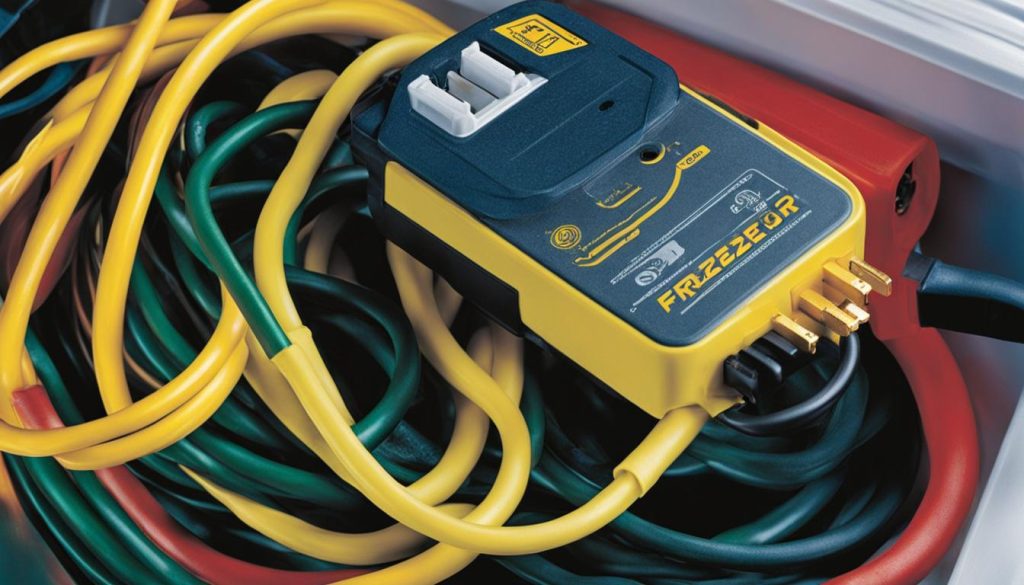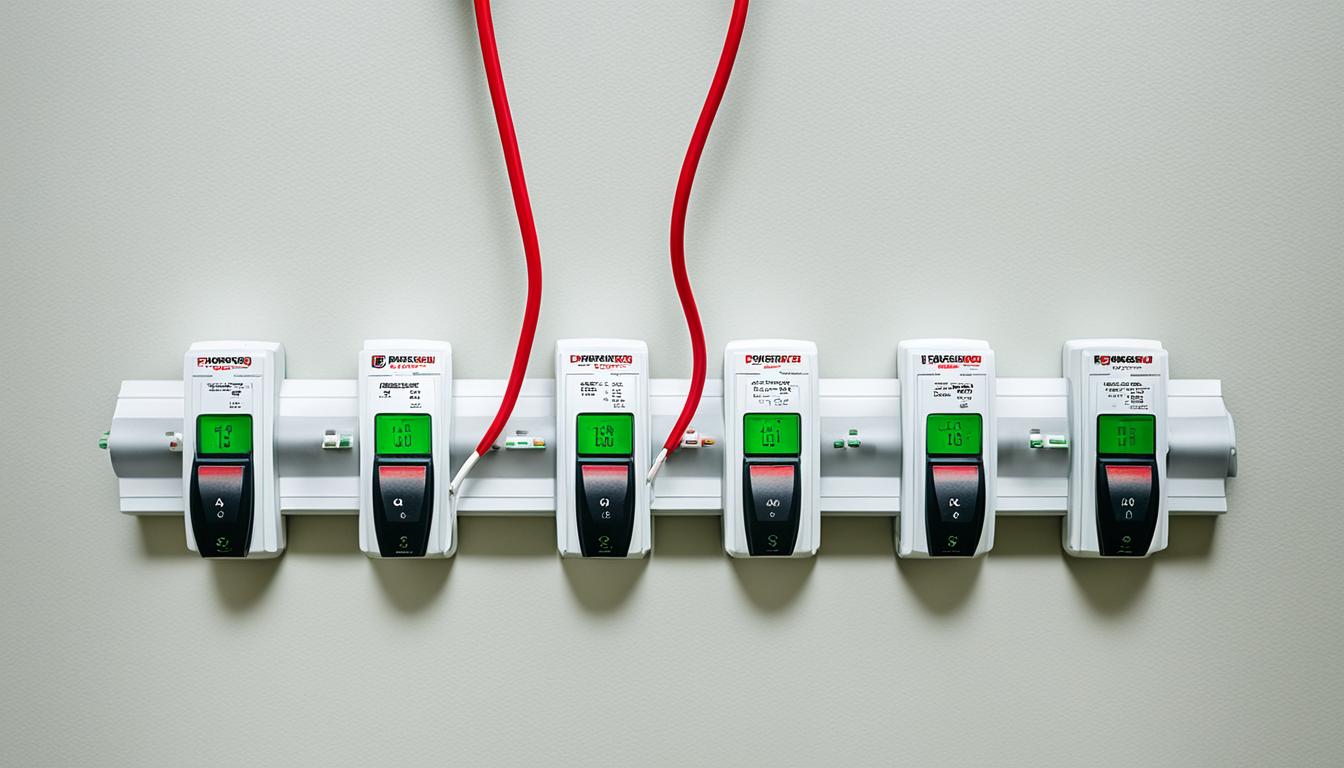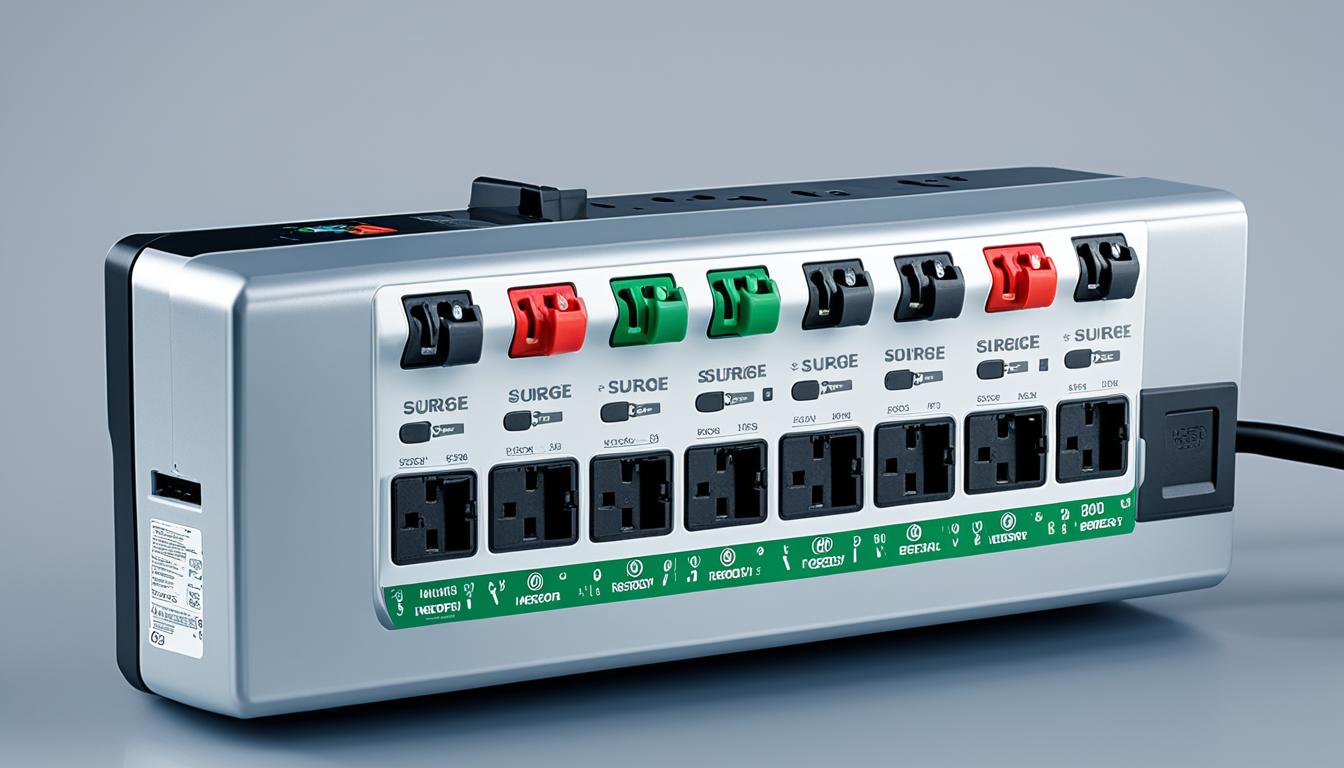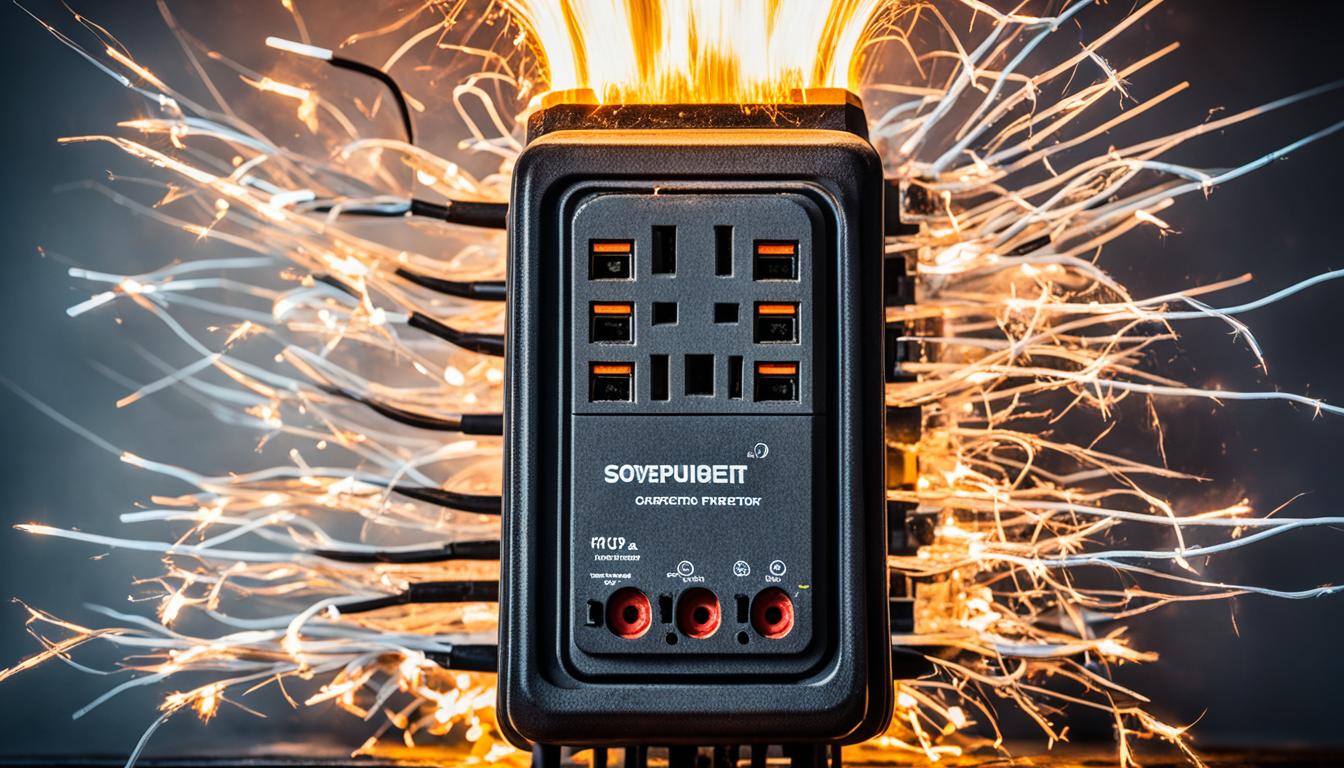When it comes to choosing the right extension cord for your freezer, there are important factors to consider. You want a cord that can handle the power requirements of your freezer while ensuring safety and reliability. In this article, we will guide you on finding the best heavy-duty extension cord for your freezer, so you can keep your frozen goods stored safely and efficiently.
Key Takeaways:
- Choose a 15-20 amp heavy-duty extension cord for your freezer.
- Keep the length of the cord as short as possible to minimize voltage drop.
- Consider alternatives like relocating the freezer or installing a dedicated electrical outlet.
- Follow electrical codes and regulations to ensure safety and compliance.
- Consult a professional electrician for expert advice and installation.
What Type of Extension Cord Do I Need for a Freezer?
According to user discussions, a
12 gauge grounded extension cord
is recommended for a freezer. It should have a minimum capacity of
15 amps
, but preferably
20 amps
. The length of the extension cord should be determined based on the distance between the freezer and the electrical outlet.
It is important to note that permanently using an extension cord for a freezer is not recommended, as it may be a code violation. However, if using an extension cord is the only option, it is essential to choose a
heavy-duty cord
that can handle the power requirements of the freezer.
Benefits of Using a Heavy-Duty Cord
Using a heavy-duty cord specifically designed for freezers has several advantages. It ensures a reliable power supply, minimizing the risk of power interruptions and potential food spoilage. Heavy-duty cords are built to handle the power demands of large appliances like freezers, reducing the chances of overheating or circuit overloads.
Length of the Extension Cord
The length of the extension cord should be carefully considered to minimize voltage drop. Voltage drop occurs when the length of the cord is too long, resulting in decreased power efficiency. To determine the appropriate length, measure the distance between your freezer and the nearest electrical outlet, and choose a cord length accordingly.
Recommended Extension Cord Specifications
When selecting an extension cord for your freezer, it is crucial to pay attention to the cord’s specifications. Here are the recommended specifications for a heavy-duty extension cord for a freezer:
- Gauge: 12 gauge
- Capacity: 15 amps (preferably 20 amps)
- Length: Based on the distance between the freezer and the electrical outlet
It is important to follow these guidelines to ensure the safe and efficient operation of your freezer.
Safety Concerns and Considerations
Using an extension cord for a freezer can pose safety risks and potential hazards. Extension cords are designed for temporary use and are not built to handle the continuous power requirements of appliances like freezers. The use of extension cords for permanent installation is often a code violation and may void warranties or insurance coverage. Heavy-duty extension cords designed specifically for heavy electrical loads are available, but they should still be used with caution. It is best to avoid using extension cords for freezers if possible and instead consider options like relocating the freezer or installing a dedicated electrical outlet closer to the freezer location.
Potential Hazards and Risks of Using Extension Cords for Freezers
- Electrical Overload: Extension cords that are not rated for heavy-duty use may overheat and cause an electrical overload, posing a fire hazard.
- Voltage Drop: Longer extension cords can experience voltage drops, affecting the performance and efficiency of the freezer. This can lead to inadequate cooling and potential food spoilage.
- Tripping Hazards: Extension cords lying across walkways or areas with foot traffic can pose tripping hazards, increasing the risk of accidents and injuries.
- Code Violations: Many electrical codes prohibit the use of extension cords for permanent installations, as they are not intended for long-term use and may not meet safety standards.
If you must use an extension cord for your freezer, prioritize the following:
- Heavy-duty electrical extension cord: Invest in a durable and high-quality heavy-duty extension cord specifically designed for heavy electrical loads. Look for one that is rated for the voltage and current requirements of your freezer.
- Proper Length: Choose an extension cord that is as short as possible to minimize voltage drop and maximize electrical efficiency.
- Regular Inspection: Inspect the extension cord regularly for signs of wear and damage. Replace it immediately if you notice any frayed wires or other defects.
However, it is still advisable to explore alternatives to using an extension cord for your freezer. Relocating the freezer to a location where it can be plugged directly into a dedicated electrical outlet is a safer option. Another alternative is to consult an electrician and have a new electrical outlet installed closer to the freezer’s location.

| Extension Cord Type | Features | Price |
|---|---|---|
| Heavy-Duty Electrical Extension Cord | Designed for heavy electrical loads | $35 – $40 |
| Standard Indoor Extension Cord | Regular indoor use | $10 – $20 |
| Outdoor Extension Cord | Weather-resistant | $15 – $30 |
Importance of Following Electrical Codes and Regulations
Electrical codes and regulations exist for a reason – to ensure the safety and reliability of electrical systems and appliances. When it comes to connecting a freezer to a power source, it’s crucial to adhere to these codes and regulations to minimize safety hazards and potential damages.
One common mistake many people make is using an extension cord as a substitute for a proper power cord for their freezer. While it may seem like a convenient solution, it can have serious consequences. The starting current, also known as inrush current, for a freezer’s compressor can be significantly higher than the running current. This means that an extension cord may not be able to handle the initial power surge, leading to overheating or circuit overloads.
By following electrical codes and regulations, you ensure that the power supply to your freezer is stable and secure. It also helps prevent any potential fire hazards or electrical failures that may result from improper connections.
Using an extension cord for your freezer may jeopardize its safe operation and longevity. It’s always best to follow electrical codes and consult a professional electrician for any modifications or installations.
Remember, electrical codes and regulations vary by location, so it’s important to familiarize yourself with the specific guidelines that apply to your area. In the United States, the National Electrical Code (NEC) is the standard for electrical safety. Adhering to the NEC and other relevant codes ensures that your electrical system is up to code and meets the necessary safety standards.
Consult a Professional Electrician for Compliance
If you have any doubts or questions about the electrical setup for your freezer, it’s always best to consult a professional electrician. They have the expertise and knowledge to assess your current setup, identify any potential risks, and recommend appropriate solutions.
A professional electrician can help ensure that your freezer is properly connected to a dedicated electrical circuit and that all the wiring and connections meet the necessary codes and regulations. They can also advise you on any additional safety measures that may be required, such as ground fault circuit interrupters (GFCIs) or surge protectors.
Investing in the expertise of a professional electrician not only ensures the safety of your freezer but also provides peace of mind knowing that your electrical system is compliant with all applicable codes and regulations.
Alternatives to Using an Extension Cord
If using an extension cord for your freezer is not an option or is not recommended, there are alternative solutions to consider. One option is to relocate the freezer to a location where it can be plugged directly into a dedicated electrical outlet. This eliminates the need for an extension cord and ensures a more reliable and safe power supply for your freezer.
Another alternative is to install a new electrical outlet closer to the freezer’s location. This can be done by a professional electrician who will ensure that the wiring and circuits can handle the power requirements of the freezer. By having a dedicated outlet in close proximity, you can avoid the potential hazards and limitations associated with using an extension cord.
It is crucial to prioritize safety and compliance with electrical codes and regulations when considering these alternatives. Hiring a professional electrician is highly recommended to ensure that the electrical system is properly configured and meets all the necessary requirements. With their expertise, they can guide you in selecting the right heavy-duty freezer cord or heavy-duty extension cord, and install the necessary infrastructure for a safe and efficient electrical connection for your freezer.
FAQ
What type of extension cord should I use for my freezer?
When choosing an extension cord for your freezer, it is important to consider the power requirements and safety concerns. A heavy-duty extension cord is recommended to ensure a reliable power supply. It should have a minimum capacity of 15 amps, but preferably 20 amps. The length of the cord should be kept as short as possible to minimize voltage drop.
Can I use any extension cord for my freezer?
It is not ideal to use any extension cord for your freezer. Using an extension cord that is not heavy-duty or does not meet the power requirements of your freezer can pose safety risks and potential hazards. It is important to choose a heavy-duty extension cord specifically designed for heavy electrical loads.
Are extension cords safe for long-term use with a freezer?
Extension cords are designed for temporary use and are not built to handle the continuous power requirements of appliances like freezers. Using an extension cord for long-term use with a freezer can be a code violation, may void warranties or insurance coverage, and can pose safety risks. It is recommended to avoid using extension cords for freezers if possible and consider alternative solutions.
Can using an extension cord for my freezer lead to overheating or circuit overloads?
Yes, using an extension cord for a freezer can lead to overheating or circuit overloads. The starting current for a compressor can be significantly higher than the running current, and using an extension cord that cannot handle the power requirements of the freezer may cause the cord to overheat or the circuit to overload. This can pose safety hazards and damage the appliance.
What are some alternatives to using an extension cord for my freezer?
If using an extension cord for your freezer is not recommended, there are alternative solutions to consider. These include relocating the freezer to a location where it can be plugged directly into a dedicated electrical outlet or installing a new electrical outlet closer to the freezer’s location. Consulting a professional electrician is highly recommended to ensure the electrical system is properly configured and compliant with electrical codes and regulations.


